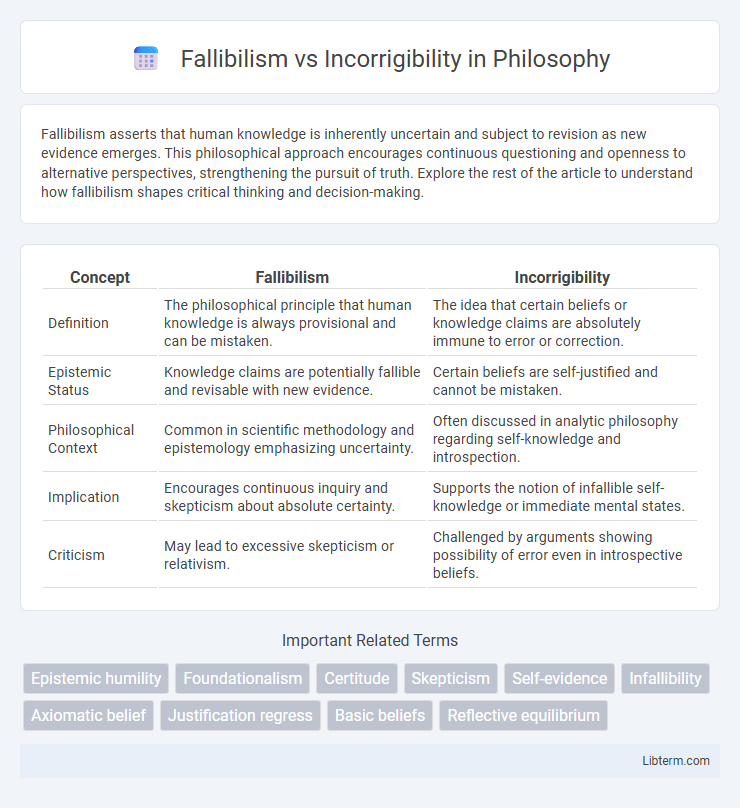Fallibilism asserts that human knowledge is inherently uncertain and subject to revision as new evidence emerges. This philosophical approach encourages continuous questioning and openness to alternative perspectives, strengthening the pursuit of truth. Explore the rest of the article to understand how fallibilism shapes critical thinking and decision-making.
Table of Comparison
| Concept | Fallibilism | Incorrigibility |
|---|---|---|
| Definition | The philosophical principle that human knowledge is always provisional and can be mistaken. | The idea that certain beliefs or knowledge claims are absolutely immune to error or correction. |
| Epistemic Status | Knowledge claims are potentially fallible and revisable with new evidence. | Certain beliefs are self-justified and cannot be mistaken. |
| Philosophical Context | Common in scientific methodology and epistemology emphasizing uncertainty. | Often discussed in analytic philosophy regarding self-knowledge and introspection. |
| Implication | Encourages continuous inquiry and skepticism about absolute certainty. | Supports the notion of infallible self-knowledge or immediate mental states. |
| Criticism | May lead to excessive skepticism or relativism. | Challenged by arguments showing possibility of error even in introspective beliefs. |
Introduction to Fallibilism and Incorrigibility
Fallibilism asserts that human knowledge is inherently uncertain, allowing for the possibility of error in all beliefs and theories, which encourages continuous inquiry and revision. Incorrigibility, in contrast, refers to certain beliefs or knowledge claims that are immune to error and cannot be proven wrong by the subject holding them, often linked to self-knowledge or immediate experiences. Understanding the distinction between fallibilism and incorrigibility is essential in epistemology, as it shapes perspectives on the limits and nature of human understanding and justification.
Defining Fallibilism: Core Principles
Fallibilism asserts that human knowledge is inherently provisional and subject to revision based on new evidence or reasoning, emphasizing the possibility of error even in well-established beliefs. Core principles include the recognition that certainty is unattainable and all claims to knowledge remain open to challenge and falsification. This stance contrasts with incorrigibility, which holds certain beliefs or statements as immune to error or correction.
Understanding Incorrigibility in Epistemology
Incorrigibility in epistemology refers to the idea that certain beliefs or mental states are inherently immune to error, meaning one cannot be mistaken about them. This concept contrasts with fallibilism, which holds that all knowledge claims are subject to revision and potential error. Understanding incorrigibility centers on recognizing self-evident truths or immediate experiences that are considered epistemically privileged and beyond doubt.
Historical Roots of Fallibilism and Incorrigibility
Fallibilism traces its historical roots to the philosophical skepticism of ancient Greece, notably through Socratic questioning and Pyrrhonian skepticism, emphasizing the inherent possibility of error in human knowledge. Incorrigibility finds its origins primarily in Cartesian philosophy, where Rene Descartes posited certain self-evident truths accessible through introspection that are immune to doubt or correction. The contrast in their historical development highlights the evolution from classical skepticism to early modern certainty in epistemology.
Key Philosophers and Their Perspectives
Fallibilism, championed by Charles Peirce, asserts that human knowledge is inherently imperfect and subject to revision, emphasizing the importance of doubt and inquiry. In contrast, the principle of incorrigibility, as defended by Rene Descartes and later by G.E. Moore, holds that certain beliefs, particularly those concerning one's own mental states, are immune to error and cannot be corrected. These opposing views highlight the philosophical debate on the reliability of self-knowledge and the conditions under which beliefs can be considered infallible or corrigible.
Arguments Supporting Fallibilism
Fallibilism asserts that human knowledge is inherently provisional and subject to revision based on new evidence or reasoning, contrasting with incorrigibility's claim that certain beliefs are immune to error. Philosophers supporting fallibilism cite historical examples of scientific theories once considered certain but later disproven, highlighting the importance of openness to correction. Empirical successes and the self-correcting nature of scientific inquiry reinforce fallibilism as a more realistic epistemological framework compared to the rigid certainty demanded by incorrigibility.
Arguments Supporting Incorrigibility
Incorrigibility asserts that certain mental states, particularly beliefs or sensations, are immune to error when directly accessed by the subject, grounding this claim in the immediacy and authority of first-person awareness. Philosophers argue that incorrigibility is supported by the principle that self-ascriptions of experiences or beliefs cannot be mistaken, as they do not rely on external evidence or interpretation. This contrasts with fallibilism, which allows that even self-knowledge can be prone to error, but incorrigibilists emphasize the unique epistemic status of subjective mental states to defend their immunity from error.
Practical Implications and Contemporary Relevance
Fallibilism acknowledges that human knowledge is inherently prone to error, promoting continual questioning and revision of beliefs in scientific research and legal decision-making. Incorrigibility asserts certain beliefs or statements are immune to error, reinforcing confidence in self-evident truths, particularly in epistemology and artificial intelligence. Practical implications include cultivating critical thinking in education and adaptive reasoning in technology, ensuring robust systems that accommodate uncertainty while valuing foundational certainties.
Fallibilism vs Incorrigibility: Comparative Analysis
Fallibilism asserts that all human knowledge is provisional and subject to error, emphasizing the possibility of revising beliefs based on new evidence, while incorrigibility holds that certain beliefs, especially self-knowledge claims, are immune to error and cannot be proven wrong. The comparative analysis highlights fallibilism's openness to correction and empirical validation against incorrigibility's assertion of absolute certainty in introspective judgments. Fallibilism dominates scientific epistemology by promoting continuous inquiry, whereas incorrigibility is central to some theories of mind emphasizing infallible self-awareness.
Conclusion: Navigating Certainty and Error
Fallibilism acknowledges the potential for error in all knowledge claims, emphasizing continuous inquiry and revision. Incorrigibility asserts certain beliefs, particularly self-evident ones, as beyond doubt or error, grounding absolute certainty. Balancing fallibilism's openness with incorrigibility's assurance navigates the complex terrain between doubt and certainty in epistemology.
Fallibilism Infographic

 libterm.com
libterm.com